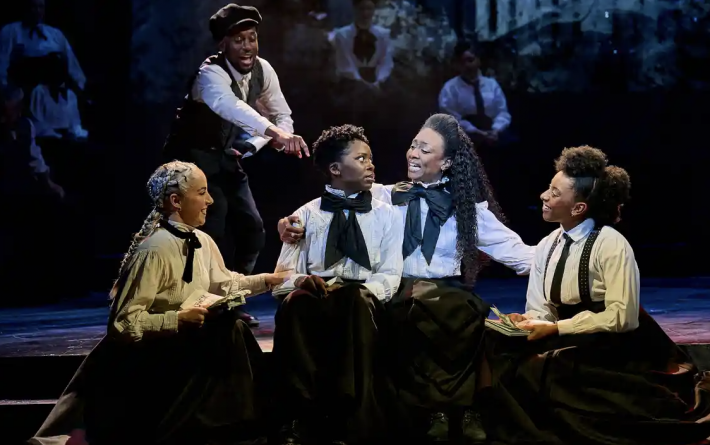‘Sylvia’ is a play that tells the story of Sylvia Pankhurst and the fight for the vote of working-class women. Pankhurst is a well-known surname when we talk about the suffragette movement. Led by her mother, Emmeline Pankhurst, Sylvia joined the fight for the female vote in the United Kingdom. This gripping story walks us through the life of Sylvia and the movement for suffragism, from the early Women’s Social Political Union (WSPU) to her distancing from her family, to the final recognition for the vote of all women. The play is a delight to see. The actors played sublime roles, accompanied by great songs and striking choreography. The band was playing on stage, which could be seen performing when there was a change in the lights. The simplicity of the stage and scenery was especially compelling because it made the performance stand out. The theatre set was moved around along the change in scenes by the actors, which was done with such playfulness that it resulted in an absolute joy to watch.
The story begins with a fierce Emmeline Pankhurst enticing her daughters to take part in the WSPU. The Pankhurst family had a long-standing relationship with Keir Hardie, an MP for the Labour Party, at the beginning of the 20th century. The plot explores the milestones of the suffragette movement, portraying critical moments like the relation with Hardie, the Labour MP, the death of a suffragette who died in the 1913 Epsom Derby, the arrest of thousands of women as a political strategy, or the refusal to eat as a protest during their imprisonment. Sylvia stood alongside her mother and sister for many years; however, an irreconcilable point led to their distancing: political goals.
Sylvia was a socialist who often tried to confront her mother’s ideas. Sylvia believed that the means her mother used to advocate for the vote would not lead to the recognition of all women, which was later confirmed when a bill was passed in 1918 for female suffrage excluded working-class women. Sylvia fought incessantly for the female working-class vote, which was finally recognised in 1928, while her mother and sister stepped down from the fight and campaigned for the Conservative Party. The play has a clear message: social class is a factor that must be considered. It was striking to see how such a powerful argument, fight and struggle is still relevant today, almost a hundred years later.
We live through an era of change; we can see on the media and the news that rights are being denied or, even worse, removed on what almost seems like a daily basis in different corners of the world. We are living through a constant crisis in which the same people always pay the highest price: the working class. We are seeing what happened with female suffragism over and over and over again. Shockingly, many people remember Emmeline Pankhurst, and purposely (or not), we tend to forget who Sylvia Pankhurst was. The reality is that due to her incessant work, all women across the UK were granted the right to vote, no matter the properties someone owned or the social class they belonged to.
By and large, ‘Sylvia’ is a must-see production that will surely leave a lasting impression on anyone who experiences it. From the incredible performances to the stunning staging, this play is an absolute delight.
As Ruby Christian, one of the students, expressed after the show, Sylvia was a breathtaking performance, I enjoyed it thoroughly. It tackled women’s issues in the 19th / 20th centuries, and I deeply connected with it. In addition, the music, choreography and actors were outstanding.
Alen Melero Yerinkova, University of Westminster
